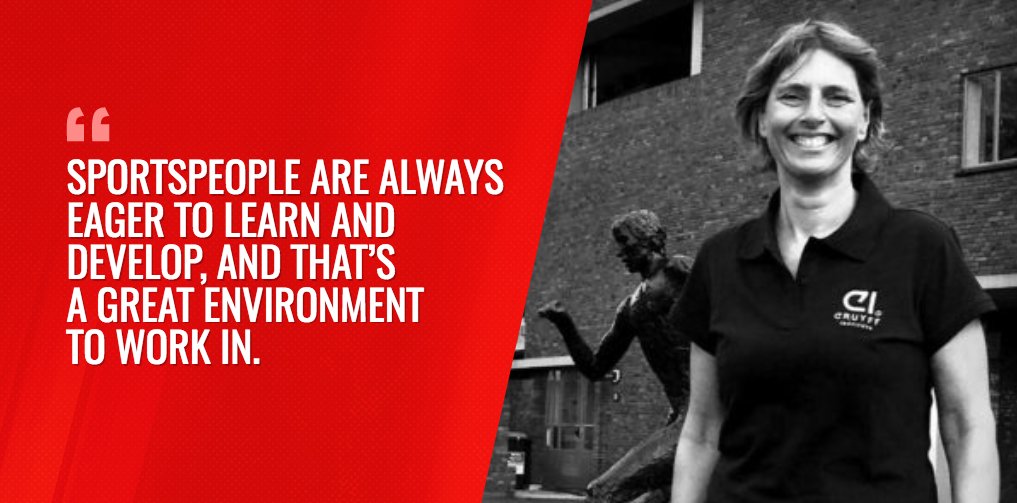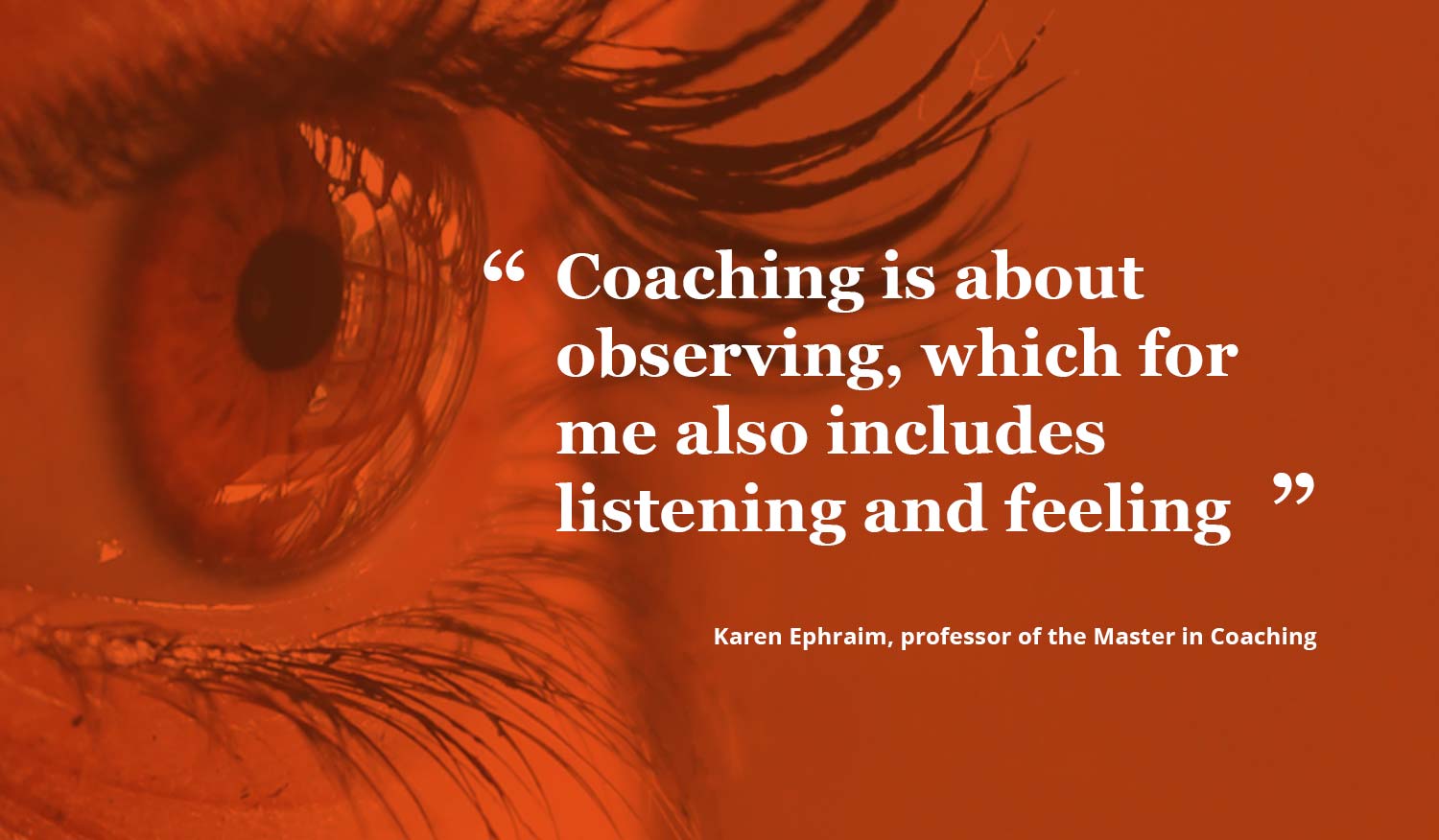Search the latest and greatest job opportunities in sport
Karen Ephraim, professor of the Master in Coaching at the Johan Cruyff Institute, talks about her long experience working in different sports and the value of individual development for the benefit of the group.
Physical education teacher, volleyball coach, founder and coach of a wheelchair rugby team and currently a teacher of the Master in Coaching at the Johan Cruyff Institute . Karen Ephraim is a clear example that a good coach can work with any athlete, no matter what their sport is or whether they are a man or a woman.
“Coaching is about observing, which for me also includes listening and feeling,” says Karen. She has had the teacher genes since she was little; she got her love for her profession from her parents, who were both teachers. Karen has had many different professional experiences and now enjoys teaching. “Athletes are people who are eager to learn and improve. I love the environment in which I work.” In this interview, she talks about her method and her extensive background.

Can you tell us how you became a coach and what your own coaching journey has been like so far?
I started my career as a teacher in physical education and I worked at a high school for 10 years. When I was working with the children in the school, my focus was always on their development and that is what I still focus on now.
When I worked at the school I was also a volleyball coach, and had the same focus. After a few years, I founded and coached the wheelchair rugby team at Den Haag, the city where I live in the Netherlands. I was also head coach of the national wheelchair rugby team for a few years. I very much enjoyed this, we always worked on possibilities and not impossibilities…which is so important in disability sports, and in development in general. So if someone can’t walk, it is useless to focus on walking, you need to focus on how they are able to move. For me, that is the same way I look at coaching in general. Wheelchair rugby is a small sport, so whether it’s men or women, they all play together in one team. It’s not about being a man or being a woman, it’s about the contribution each player can give to the team. In my opinion, in disability sports it’s easier to manage the differences because the differences are very physical and therefore very apparent. For me, it was a very good lesson in learning to coach the possibilities of those players and looking at the way I could contribute to the possibilities of each person.
Have you ever faced any equality challenges as a female coach in the Netherlands?
I think that could be an issue, but for me it has never been one. I know what I can and can’t do, and so that’s what I’m working on. For me, it’s not important if I am a male or female coach, I’m just looking to support what my players need. Maybe externally people look at me differently because I’m a woman in sport, but I don’t really notice it.

Was it always your ambition to become a teacher and to teach people how to become better coaches?
I think it has always been my ambition to be a teacher. My parents were both teachers and they showed me their love for the work they did. When I was a little girl I always wanted to be a PE teacher, so it started at school for me. I do really enjoy what I do now because sportspeople are always eager to learn and develop, and that’s a great environment to work in.
Can you share with us your experience of working as a professor on the ‘Master in Coaching’ program at the Johan Cruyff Institute?
I have been a teacher on this course since 2010, and it is a big honor to work with a group of students who are eager to develop their coaching skills. The most important part of the program for me is that it’s all about personal development. Cruyff said “you can only coach others if you can coach yourself”, so the journey we go on with the students is all about their personal development and how they can make themselves better in all that they do. It is always exciting to see the students develop in one year! We show them how important it is to watch and listen to other people. I think, for a coach, your eyes are a very important tool to be able to coach because coaching is about observing, which for me also includes listening and feeling.
In July this year, you attended the ‘Women in Football’ conference held during the European Championships in the Netherlands. What are your thoughts on this conference and do you think it is important that governing bodies continue to host events such as this?
Yes, I do think it’s important because people tend to just stick with the way they have always done things, which in this case is that more men are members of boards and technical committees than women. In order to get more women leaders in football, everyone has to be aware of this issue. So for example, traditionally, whenever there is a board meeting, most if not all of the people involved are men – and that’s the way it has always been. I think it is important to force others to change this. In this case, I think the organizations involved with the Women’s European Championships did well because they really highlighted these points and the lack of women leaders. I think it is necessary to continue to do this until the new behavior begins and having more women involved becomes a new ‘normal’.
“I think one of the most important things is that you know your players and who they are and you help them to understand themselves”
As you know, there is such a lack of women who are head coaches in football. However, those that are tend to be very successful. For example, whilst less than 10% of all women’s national teams have female head coaches, the success rate for winning a championship for teams with a female head coach is 92% in global competitions… Why do you think this is?
It was good to see the Netherlands win the European Championships hosted in the Netherlands and that all the hard work that Sarina Wiegman (the head coach) had put in paid off. She has worked for so many years in football, she is very professional and in my opinion did everything a good coach should be doing, i.e. seeing and hearing every aspect of the game. I don’t know her personally, but I think she has always been busy being a football coach and not being a female football coach. She did what she thought was needed to be the best football coach and that was her ambition. It was so wonderful to see them win! I think that the women who are given the head coaching jobs have had to prove, and prove again and again, how good they are as coaches. They have to prove themselves so much more than men have to. This makes me think of the German football referee Bibiana Steinhaus who last week refereed in the German men’s league, and she got really positive feedback. She said that she doesn’t want to be seen as an example and, in her own words, “I do what I love to do and I just want to be very good.” Like I said before, we are not used to having female coaches in high positions, and as long as it is not normal, we have to work hard to get up there and for it to be normal. Firstly, the female coaches themselves have to work hard to get themselves to that position, and secondly, we have to support them and create those opportunities.
What would you say is the most important trait or attribute that a successful sports coach needs and why?
I think one of the most important things is that you know your players and who they are and you help them to understand themselves. That way, you can give them what they need and deal with their individual needs.
What advice would you give to women who want to progress in their coaching career?
I think one of the things is to work hard. Know what your possibilities are and the things you are not good at. Work hard to get better at what you do. Don’t focus on being a woman, focus on how you can progress. You may do things differently to a male coach, but you should realize that this is a good thing!
This article was written by our academic partner, Johan Cruyff Institute . For more information on their Master in Coaching progammes click here.
Search the latest and greatest job opportunities in sport
One of the many key success factors when assessing the quality of degree programmes is the employability rate of its gra...
Read moreThe global major event industry is one of the most thrilling and impactful career paths you can choose. If you’re lookin...
Read moreStarting his career in New Zealand within sports events, Regan gained valuable experience with Hockey New Zealand and Ne...
Read more